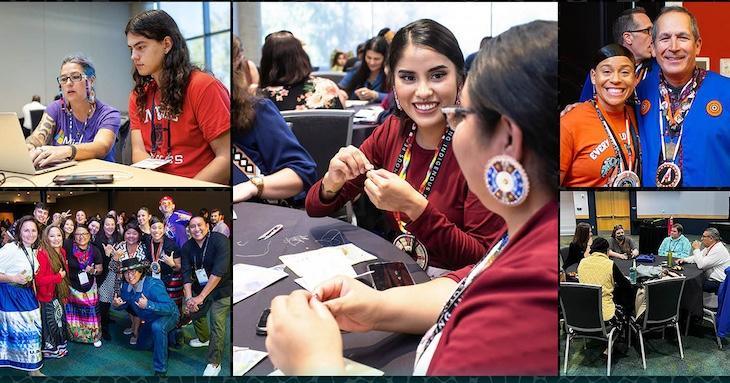-
How to Have Difficult Conversations
Whether it’s addressing a conflict with a friend, providing constructive feedback at work, or discussing sensitive topics with family members, difficult conversations are inevitable. Especially at work, where you must continue to work together smoothly and cooperatively, being able to have difficult conversations is an important skill. These conversations can be challenging, but with the right approach, they can lead to positive outcomes and stronger relationships. Here are some strategies to help you navigate difficult conversations effectively.
-
How to Get the Most Out of the AISES National Conference
It’s time again for the AISES National Conference! This year’s conference will take place in San Antonio, Texas, from October 3 to 5 — don’t miss this amazing opportunity for new and returning Indigenous students and professionals to learn, grow, and share their knowledge. It can be challenging to step away from your responsibilities, so if you are able to attend you want to make it worthwhile. Here are a few ways to ensure you get the most out of the AISES National Conference.
Make a List -
Get Back to Work: Finding Motivation
If your motivation has left the building, you’re not alone. According to Gallup, approximately 80 percent of employees worldwide are not engaged — or are actively disengaged — at work. This lack of motivation can make it challenging to accomplish parts of your job. Here are a few ways to regain the stimulus you need to get back to work.
Create Achievable Goals -
Take a Break: The Importance of Recharging
Americans say their mental health is declining, according to a recent Gallup poll. One potential reason is that few of us take time to recharge or even take a daily break. With today’s go-go mindset, finding time to relax each day can be challenging. Here are a few reasons why taking a break is so important.
It's Good for Your Brain -
Tips for the Job Interview
A recent study found that the average candidate is interviewed 10–20 times before receiving a job offer. That’s a lot of interviews. Naturally you want to be ready for every interview you’re invited to, and as the job recruitment landscape continues to evolve, it’s important that you stay in the loop. Here are some tips to ensure that all your interviews are positive.
Be Prepared and Specific -
What to Consider When Changing Careers
At some point, most of us have asked, “Is this really what I want to be doing for the rest of my life?” or “Is there something else out there for me?” These types of questions are common. In fact, according to a recent release from the Bureau of Labor Statistics, individuals may change jobs up to eight times between the ages of 18 and 30. If you’ve thought about changing careers but aren’t sure if it’s the right move, here are a few things to consider.
Figure Out What You Want -
How to Highlight Your Value
Getting to a place where you stand out among your peers can be challenging. With remote and hybrid work environments, unstable industries, and more generations in the workforce than ever, employers aren’t always able to focus on the value individual team members bring. Instead of hoping that your manager recognizes your value, take steps to show them. Here are some ways to highlight your value to your manager and organization.
Do (Good) Work -
Managing Up and Why It’s Important
“Managing up” has long been a part of the vernacular in the professional world, but what is it exactly? Depending on whom you ask, the definition may vary. Some believe managing up is when employees create positive and meaningful relationships with their direct managers and upper-level management. Others say it’s just about making your boss’s job easier. Ultimately, managing up involves learning how best to communicate with your manager and fulfill deliverables. If done well, managing up can have many positive results. Here’s why.
-
Improving Your Workplace Communication
Communication skills is at the top of the list of what hiring managers are looking for. And with good reason. Strong communication is how we show attention, inspire change, and get things done. It's what allows relationships to develop smoothly. It's how we show attention, inspire change, and get things done. In the workplace, an effective communicator motivates a team and promotes productivity. How you communicate contributes to your own success, and ultimately to that of your organization.
-
Tips for Completing a Self-Evaluation
Performance evaluations are useful tools to help managers and employees understand how they are doing and where they may be able to improve. If you haven’t already, you’ll likely be asked to complete a self-evaluation prior to a performance review. For many professionals, that can be a daunting task. However, preparing a self-evaluation doesn’t have to be difficult. Here are a few tips to consider when working on your next self-evaluation.
Be Honest











